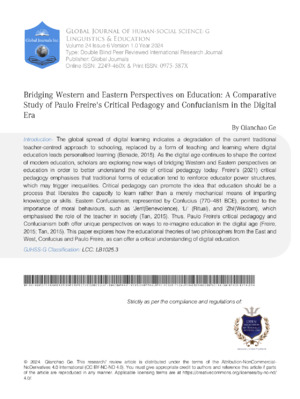Bridging Western and Eastern Perspectives on Education: A Comparative Study of Paulo Freires Critical Pedagogy and Confucianism in the Digital Era
Keywords:
Abstract
The global spread of digital learning indicates a degradation of the current traditional teacher-centred approach to schooling replaced by a form of teaching and learning where digital education leads personalised learning Benade 2015 As the digital age continues to shape the context of modern education scholars are exploring new ways of bridging Western and Eastern perspectives on education in order to better understand the role of critical pedagogy today Freire s 2021 critical pedagogy emphasises that traditional forms of education tend to reinforce educator power structures which may trigger inequalities Critical pedagogy can promote the idea that education should be a process that liberates the capacity to learn rather than a merely mechanical means of imparting knowledge or skills Eastern Confucianism represented by Confucius 770 481 BCE pointed to the importance of moral behaviours such as Jen Benevolence Li Ritual and Zhi Wisdom which emphasised the role of the teacher in society Tan 2015 Thus Paulo Freire s critical pedagogy and Confucianism both offer unique perspectives on ways to re-imagine education in the digital age Freire 2015 Tan 2015 This paper explores how the educational theories of two philosophers from the East and West Confucius and Paulo Freire as can offer a critical understanding of digital education
Downloads
How to Cite
References

Published
2024-08-24
Issue
Section
License
Copyright (c) 2024 Authors and Global Journals Private Limited

This work is licensed under a Creative Commons Attribution 4.0 International License.